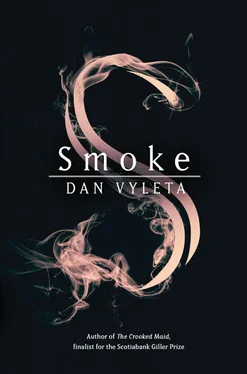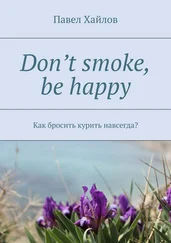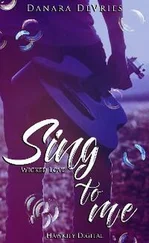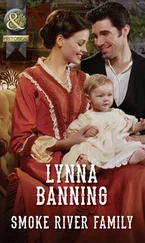In the squalid little hallway, the same three sets of footprints were visible on the floorboards, along with a fourth, wearing narrow riding boots and attended by a large-pawed dog. Near the door to the living room, one of the stable hands had dropped his club. He had not stooped to pick it up.
Beyond this point, the prints no longer showed. Indeed, one had to squint to make out the shadow of blood upon the blackened floorboards. It was as though a great fire had raged in the room, a fire that consumed only people and left the furnishings untouched. There had been two centres to the fire: the first an armchair, whose worn leather was covered in an oily layer of Soot, a finger deep; the second on the floor, two steps away, where a body had written a sickle of deepest black into the dark flooring. The blood had pooled there and mixed with the Soot; it formed a sort of treacle, stringy to the touch.
When people burn to death, their bodies fold into themselves, into the posture of unborn children: the knees tucked up to the chest, the fists raised high in front of the face like pugilists taking cover, the skin a black tissue above bone. It was tempting to ascribe this position to the man who had lain there on the floor, bleeding from an abdominal wound which, Cruikshank assures me, “had his innerds pokin’ through.” I have rarely seen him this upset.
I made, during my initial visit, only the most perfunctory search of the doctor’s private papers. There were a number of incriminating manuscripts, suggesting research into illegal matters, as well as a wealth of foreign correspondence, which I made sure to take along lest they fall into the wrong hands. It was only on a second visit, some hours later, that I found, tucked inside a handsome portable desk of mahogany and rosewood, a very interesting if incomplete report pertaining to Charlie Cooper, and discovered a room upstairs whose bed frame was fitted with leather manacles at either side.
One need not have been a justice of the peace to string these facts together to a narrative of sorts and endow it with a plot. All the same Cruikshank insists that the girl came to his door alone; that he looked outside and found no other tracks leading up to his home. I suppose he has a soft spot for Cooper and imagines he is doing him a favour. When we lie from sympathy, I have found, the Smoke seems fit to spare us. It is the sort of fact that keeps Swinburne up at night; runs counter to his view of things.
The girl mutters something, deep in her sleep, and summons me back from my reverie. I bend my ear down to her lips until my cheek nearly touches her nose. She makes me wait for several minutes until she speaks again, and I stand there, awkward, my fundament pushed back for balance and bending double at the waist, looking for wisdom from the mouth of babes. When it comes, the word that travels across the gap of air is fragile, foreign, unexpected.
“Asch-en-stedt.”
I wonder what it was about living with Renfrew that made her snoop around his private papers, and what it was she did to punish herself for so obvious a sin.
ф
A noise runs through my chambers. I know at once what it is, and yet I have never heard it before, not here, in my rooms, atop the kingdom that is my school. It cuts me to the marrow. It is a noise that must not exist. There it comes again, the shrill bleating of a bell. It jerks me upright, sees me race to the door. I lock her in, the girl, just as the third ring sounds; am by the custom-built cupboard at the fourth. It takes me three more rings to find the key; insert it (how clumsy my fingers are, how sweaty my palm!), turn it, and open the cupboard door. The ringing only stops when I take the receiver off the hook.
“Hullo,” I say, unsure of the procedure. “Samuel Trout here.” And then, blustery in my confusion, whispering hoarsely into the funnel jutting out of the wooden box: “This had better be an emergency!”
The voice that answers is so immediate, it seems to stand in the room with me. Its words pour out from the shell of the receiver straight into my ear; they have a crackle to them, as though someone were talking to you in a storm. I listen carefully, find myself nodding, before realising that it is sound that is transmitted, not motion.
When I hang up, I lock the cupboard very carefully, place the key in my pocketbook, and change into my travelling clothes. Half an hour later sees me leave the school in our fastest trap. In my carpetbag, clutched against the soft of my chest, are thirty pounds sterling, two changes of undergarments, my razor, my hairbrush, ten illegal cigarettes, and a box of sweets.
The Colt I wear in its holster. It rides high up my flank, the butt turned outward, like a doorknob growing out of the hollow of my armpit. Outside, the land lies dark under a sickle moon.
I asked him whether there was a great fire anywhere? For the streets were so full of dense brown smoke that scarcely anything was to be seen.
“Oh, dear no, miss,” he said. “This is a London particular.”
I had never heard of such a thing.
“A fog, miss,” said the young gentleman.
“Oh, indeed!” said I.
CHARLES DICKENS, BLEAK HOUSE (1853)
It is hard to say when exactly it starts. Thomas is tired, busy with his fatigue and his wound, his thoughts about Charlie. He is lying in the corner of the train wagon, the squawk of chickens by his ear. Two steps from him the door to the wagon remains wide open. A savage wind whips at them whenever they gather speed, then relents when the train labours up a hill. There are other men in the wagon, other vagrants, a group of two and a third, a solitary man. Livia is sitting far from them, her knees tucked into her chest. It is only later that Thomas realises that she is trying to hide her breasts.
The men sniff her out all the same. It begins without rancour, witless banter about what a pretty boy she is, how creamy her skin.
“Short for ’is age,” one man ventures, shouting against the wind. “A little scrawny. But nice ’ealthy thighs.” When she gets up to shift closer to Thomas, his mate calls after her: “Don’t you worry, pet, we’re just having a bit of fun.” The little Smoke that wafts over from them is playful and oddly inclusive, as though inviting them to join their game.
It is the solitary man who changes the equation. He climbed on later, hours into their journey, running alongside the train at the steepest side of a hill. This man is not interested in Livia. It’s lunch he wants. The chickens are packed into two massive crates, sturdy enough to discourage thievery but perforated at the side to let in air. All one sees of them is a mass of feathers; the occasional blood-red beak sticking out of a perforation; a dozen unblinking eyes. They are packed in willy-nilly, literally stacked on top of each other, are restless, squawking, fighting for floor space and air. The man has hooked two fingers through one of the holes. His face is weather-beaten, the creases caked with Soot. Light, deep-set eyes. It is as though their colour has run.
He catches something, pulls back his arms, holds a chicken foot hooked between his fingers. The man continues tugging until pale pink cartilage broadens to a wedge of fine white feather. Then he gets stuck: the hole just isn’t big enough.
At first Thomas thinks the man means to cut off the leg. But it appears he has no knife. Rather he just continues pulling, his dark face growing darker with the effort. A riot of chicken squawks plays chorus to his effort.
When the blood starts flowing, the man starts smoking, and when his Smoke reaches the other two men, all that is dark in them rises up like a dog called to its master. Again they turn to Livia, and again they begin teasing her, but there is a different quality now to their taunts, something dangerous and needy, and the language soon grows coarse.
Читать дальше












